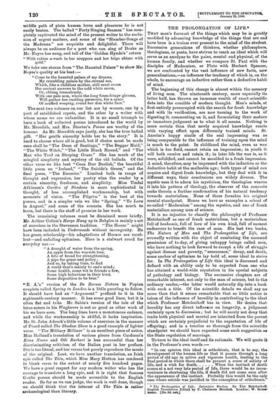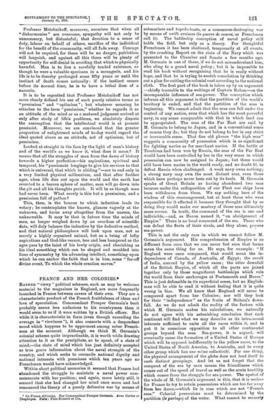THE PROLONGATION OF LIFE.* THAT man's forecast of the things
which may be is greatly modified by advancing knowledge of the things that are and have been is a truism ever present to the mind of the student. Successive generations of thinkers, whether philosophers, theologians, or poets, have striven to reach an ideal which will serve as an anodyne to the pains, mental and physical, of the human family, and whether we compare St. Paul with the disciples of Modernism, or Plato with Herbert Spencer, we are confronted by the vast influence of new facts, new generalisations,—an influence the tendency of which is, on the
whole, to encourage an inductive rather than a. deductive habit of mind.
The beginning of this change is almost within the memory of living men. The nineteenth century, more especially its latter half, has thrown an immense wealth of exact scientific data into the crucible of modern thought. Men's minds, at first entirely preoccupied with the search for fresh knowledge and with its verification, are now turning to the work of digesting it, commenting on it, and formulating their mature or immature judgment as to what it all means. Nothing is more certain than that newly acquired knowledge reacts with varying effect upon differently trained minds. St. Anselm's happy simile of the seal impressing wax as being comparable to the influence of training upon the mind is much to the point. In childhood the mind, even as wax which is too fluid, cannot retain an impression; in youth it will both receive and retain it ; in later life the wax is, as it were, solidified, and cannot be moulded to a fresh impression. A mind, therefore, may be impressed with the inductive or the deductive habit at the malleable age ; both types of mind can acquire and digest fresh knowledge, but they deal with it in different ways, their conclusions are widely diverse. The mystic uses it to adorn his mysticism, the theologian weaves it into his pattern of theology, the observer of the concrete seeks therein a further confirmation of his natural tendency towards materialism. None of these forsakes his original mental standpoint. Hence we have as examples a school of so-called "Modernism" among the mystics, and one of frank materialism among men of science.
It is no injustice to classify the philosophy of Professor Metchnikoff as one of frank materialism, but a materialism
full of bonhomie, full of love of his own kind, full of earnest endeavour to benefit the race of man. His last two books, The Nature of Man and The Prolongation of Life, are
avowedly written with the object of combating the assumed pessimism of to-day, of giving unhappy beings called men, who have nothing to look forward to except a life of struggle
against disease and poverty, "senescence," decay, and death, some anchor of optimism to lay hold of, some ideal to strive for. In The Prolongation of Life this ideal is discussed and
defined with an ability only to be expected from one who has attained a world-wide reputation in his special subjects
of pathology and biology. The successive chapters are of remarkable interest, not only to the man of science, but to the ordinary reader,—the latter would naturally dip into a book
with such a title. Of the scientific details we shall say no more than that it seems remarkable that so little notice is taken of the influence of heredity in contributing to the ideal which Professor Metchnikoff has in view. He denies that heredity has any direct influence on longevity, a Xdgment certainly open to discussion ; but he will surely not deny that traits both physical and mental are inherited from the parent which are certainly prejudicial to the expectation of life of offspring ; and in a treatise so thorough from the scientific standpoint we should have expected some such suggestion as the State regulation of marriage.
To turn to the ideal itself and its rationale. We will quote it in the Professor's own words :—
"In our opinion this ideal is orthobiosis, that is to say, the development of the human life so that it passes through a long period of old age in active and vigorous health, leading to the final period in which there shall be present a sense of satiety of life, and a wish for death. When the instinct of death comes at a not very late period of life, there would be no incon- venience in shortening the life, if death did not come soon after the appearance of the instinct. Probably this would be the only ease where suicide was justified in the conception of orthobiosis:
* Tho Prolongation of life Optimistio Studies. By the Metehnikoff. •
English Translation Edited by P. Chalmers MitchelL London; W. Heine- mann. gas. 6d. net.] Professor Metchnikoff, moreover, surmises that when all "disharmonies" are overcome, sympathy will not only be unnecessary, Init.- distasteful; that devotion to a sense of duty, labour on behalf of others, sacrifice of the individual for the benefit of the community, will all fade away. Courage Will not be required, for there will be no danger, patriotism will languish, and against all this there will be 'plenty of opportunity for sell-denial in avoiding that which is physically harmfnl. Man is to live a carefully tended existence, as though he were a valuable specimen in a menagerie, and his life is to be thereby prolonged some fifty years or until the instinct of death comes naturally: if the instinct comes before its normal time, he is to have a lethal dose of a narcotic.
It is to be regretted that Professor Metchnikoff has not more clearly defined his use of such purely relative terms as "pessimism" and " optimism" ; but whatever meaning he attaches to the term "pessimism," whether he regards it as an attitude of the Mind or as a matured judgment arrived at only after study of life's problems, we absolutely dispute the assumption that the intellectual world is at present pessimist. Moreover, we are convinced that the greater proportion of enlightened minds of to-day would regard the ideal quoted above as an attitude, not of optimism, but of pessimism.
Looked at straight in the face by the light of man's history and of the world's as we know it, what does it mean? It means that all the struggles of man from the dawn of history towards a higher perfection—his aspirations, spiritual and temporal, his "passionate longings to give his services to that which is universal, that which is abiding "—are to end only in a very limited physical millennium, and that after further ages, when life dies out upon the world and the earth has reverted to a barren sphere of matter, man will go down into the pit and all his thoughts perish. It will be as though man had never been. What surely is this but a pessimism, and a pessimism fall of pathos ?
This, then, is the bourne to which induction leads its votary; he contemplates the known, glances vaguely at the unknown, and turns away altogether from the unseen, the unknowable. It may be that in future time the minds of men, no longer weighed down by an overdose of scientific data, will duly balance the inductive by the deductive method, and that natural philosophers will look upon man, not as merely a highly organised animal, but as a being of lofty aspirations and God-like reason, less and less hampered as the ages pass by the taint of his lowly origin, and cherishing as his ideal something Which can be shaped and moulded into lines of symmetry by his advancing intellect, something upon which he can anchor the faith that is in him, some "far-off divine event, To which the whole creation moves."





















































 Previous page
Previous page